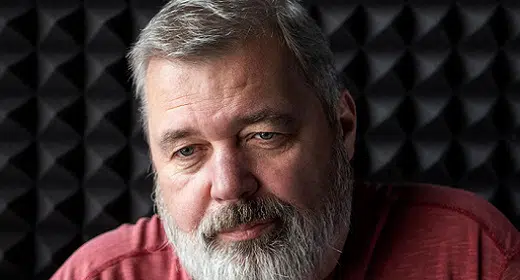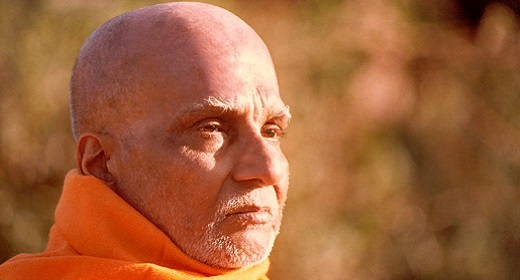by David Remnick: “We continue to call war war,” Dmitry Muratov, the editor of Novaya Gazeta, said. “We are waiting for the consequences….”
Last year, Dmitry Muratov, the editor-in-chief of the independent Russian newspaper Novaya Gazeta, shared the Nobel Peace Prize with the Filipina journalist Maria Ressa, the co-founder of Rappler, a digital publication in Manila. For three decades, under Muratov’s leadership, the paper has defied extraordinary threats as it covers government and business corruption, Kremlin politics, and armed conflict from Chechnya to eastern Ukraine. Some of its most brilliant journalists have paid the ultimate price for their work: in 2006, the writer Anna Politkovskaya was shot dead in her apartment building.
In a profile of Muratov, from November, Masha Gessen wrote of the paper, “It is not what, say, the Times or even the lefty investigative magazine Mother Jones would be under more trying circumstances. Imagine, rather, the Village Voice of the nineteen-eighties crossed with a mutual-aid society, but run, at times, like Occupy Wall Street. Novaya Gazeta is a community and a humanitarian institution, and it is very messy.” When the Nobel was announced, Muratov, a burly, bearded man who recently turned sixty, presided over a champagne-and-vodka celebration at the paper’s editorial offices in Moscow.
There is, of course, no celebration now, as the paper struggles to cover Vladimir Putin’s invasion of Ukraine. As the Russian armed forces fired on Kyiv, Kharkiv, and many other cities and towns, Muratov went on social media vowing that the paper would publish its next issue in Ukrainian as well as Russian. Our conversation via e-mail, which has been edited for length and clarity, was accomplished amid Muratov’s crowded schedule of editorial meetings, street demonstrations, and late-night phone calls.
Dmitry, tell me how you, your staff, and Novaya Gazeta have reacted to Russia’s invasion of Ukraine. Is the government putting extra pressure on you—more than before?
We gathered at the editorial office a few hours early. Everyone had a clear understanding that Putin, by his decision, had destroyed the future for younger generations, that the country would become a pariah, that we in no way would support this war. Our office managers brought in body armor and helmets from the warehouse, which had been lying idle for several years. The pressure on Novaya Gazeta and other media began immediately. It’s got to the point of absurdity. We received an order to ban the use of the words “war,” “occupation,” “invasion.” However, we continue to call war war. We are waiting for the consequences.
The Foreign Minister Sergey Lavrov declared that Russian troops were going to “liberate” the people of Kyiv. Is there any way to estimate how effective this propaganda is with the Russian people?
The ruling élite, including Foreign Minister Lavrov, revealed themselves to the whole world to be utterly dependent people, people who bend completely to the will of President Putin. It seems that they have consumed their own propaganda and have come to believe it.
Despite all the threats and restrictions, there have been antiwar demonstrations in Moscow, St. Petersburg, and many other Russian cities. Do you expect this to spread, or will it be shut down entirely? How far will antiwar sentiment go, and has it gone beyond the relatively limited range of people who read Novaya Gazeta, watch TV Rain, and listen to Echo of Moscow?
The people do not really support war, especially the war with Ukraine. More than a third are categorically against the military action. There are no rallies in support of the war. Already, a million people have signed a “No to War” petition on the Change.org platform. Russian intellectuals have also had their say: writers, screenwriters, journalists, scientists. Nearly thirty still-existing independent publications simultaneously issued a statement about the impossibility of war. So, this time, society’s customary indifference is absent.
From the outside, it seems that Putin doesn’t put up with contrary opinions among his advisers or the oligarchs. He seems to have calculated that he can absorb Western sanctions. Is there any brake, any barrier, to his taking over Ukraine, or much of Ukraine?
Putin distrusts the West. He is sincerely flummoxed by talk about “Western values.” He buys wholesale former Chancellors, Prime Ministers, and ministers from Europe, putting them on the boards of state-owned or close-to-the-state Russian companies. They have a price, but they don’t have values: I’d say that this is what he thinks.
As for whether there’s some kind of brake to his conquering Ukraine, I think it’s very difficult. His entourage is afraid to utter a word. How far Putin is willing to go—that’s not known by anyone. Obviously, he is trying to realize his own conception about the structure of the world and Ukraine. And for this he has an army. I don’t have much hope for Ukraine’s negotiations with Vladimir Medinsky, our former minister of culture, who is passionate about the principle that “truth is what is beneficial to Russia.” This is a joke.
Is it possible to describe Putin’s psychology? In the long run, what was the point of his sending troops into Ukraine? After he takes Kyiv, after arresting Zelensky—if he succeeds in these aims—what next?
That’s a difficult question. I think the plan is to divide Ukraine. With the Western part of the country, whose center is Lviv, the thinking is, Let them live as they want. Central Ukraine, with the center in Kyiv, will have the government that Putin requires, one that is oriented toward Moscow and not the West. And, as for the east, the whole Donbas will be accepted into Russia. Around eight hundred thousand people there were just given Russian passports.
Putin has been in power for twenty-two years. Is his action in Ukraine consistent with everything you have witnessed in the past—or has there been a break, a rupture? Why has he done this, despite all the examples that tell us that invasion and occupation is not merely a moral wrong but, inevitably, a strategic disaster?
I don’t know on what information Putin made this decision to invade. Of course, it’s connected to his ultimatum to the U.S., about the non-expansion of nato. Most Russian citizens do not understand this threat: nato has never attacked Russia. The version about the Ukrainian fascists seizing power—this is also not clear. People are whispering: Isn’t Zelensky Jewish? Putin went to war against a country that lost eight million people in World War Two. I can only assume that, for him, the Second World War has not ended, and that he, personally, wants to win it.
I read Novaya Gazeta this morning, and it has some excellent pieces. Tell me what’s still possible for your paper going forward. Do you have reporters in Ukraine? And what are they telling you about their sense of events?
We’ll keep working for as long as we can. We have over thirty million readers on social networks. In the past few days, we’ve had more than four and a half million views on our site. I think we’re in for a very difficult period. That’s because we did not heed the state’s recommendation to incorporate the official point of view in our assessment of events. We work according to our own standards. We trust our special correspondents who work in Ukraine and the people in our newsroom, who verify every fact. I am very worried about our journalists working in the war zone and in the border areas—and about those who cover the rallies in Moscow. I hope we keep everyone safe.
What do you expect in the weeks ahead for Novaya Gazeta?
We all agreed, in the editorial office, that the main thing is not to screw up—that we don’t betray our readers, who need continuous and verified information. We will not become propagandists. We respect the sovereignty of Ukraine—and the sovereignty of Novaya Gazeta.
The invasion has not gone the way Putin imagined. There have been many Russian losses. The economy has cratered. The country is, in so many ways, isolated. Could that lead to Putin losing power?
Putin will never leave power of his own will. The [2020] vote on amendments to the Russian constitution, which allowed him to continue his tenure as President, became, for him, a kind of referendum. He received 77.9 per cent of the vote, according to official figures, and this gives him confidence in his legitimacy. His entourage is quite convinced that “Without Putin, there is no Russia.” The speaker of the Duma, the parliament, has said this. But the younger generations of Russians, from whom the world and the future are now being taken away, no longer believe this.








































